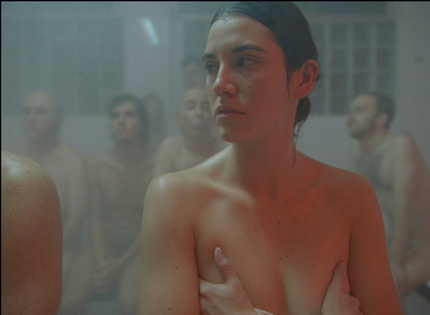EURO BEAT: Cannes Awards and Reactions, Plus a New Tomas Alfredson Project

Quoth Arnold: ""Personally I loved it. It was very brave and very tender. It dared to fail."
I also support this award (for now) because Reygadas had by far the best reaction to his win, saying "I thank the journalists who hated the film and those who loved it, who didn't only see in it a succession of interconnected images. My aim is not to be loved by the biggest amount of people, but freedom and the desire to find fraternity." Amen.
The ScreenAnarchy award for second-best awards reaction goes to Ken Loach for his response to his Jury Award for The Angel's Share. Said Loach, "The characters in my film are unemployed and everybody tells them they are worthless. But they will prove them wrong because solidarity is possible for those who resist for a better world." Double amen.
While less controversial, the other choice that puzzled me was the Grand Prix award for Matteo Garrone's Reality, a well-made, but mostly one-idea satire of media obsession in Italy. It wasn't a bad film, but it had nowhere near the force or depth of his previous film Gomorrah, and with films by Leos Carax and Ulrich Seidl actually taking risks and going for broke, it was a bit of a safe, disappointing choice.
Ah, but jury president Nanni Morretti may have used different words to describe the films that I found daring. During the press conference, he said, "I noted in general that several directors seemed more in love with their own style than with their characters. Leos Carax, Ulrich Seidl, and Carlos Reygadas' films were the ones that most divided the jury." Burn! But not so surprising given Morretti's own character-driven films like The Son's Room. He also noted that "Without going into details, no prize was agreed on unanimously, a middle ground that would have pleased no one."
Un Certain Regard and Director's Fortnight awards were less surprising or controversial, with grand prizes going to the Pablo Larrain's (Tony Manero) much-loved satire No and Michel Franco's (Daniel and Ana) Después de Lucia, respectively. I'll be catching these films and others from these categories (including Ben Wheatley's Sightseers) over the next few weeks in Paris, where both programs play again. Those in Paris who missed the Croisette action can catch the Un Certain Regard program at Reflet Medici, the Critic's Week program at the Cinematheque and the Director's Fortnight at Forum Des Images.
A full list of winners in all categories is below, and if you're interested a more comprehensive round-up of the mannered reactions from winners, Cineuropa has assembled a nice list.
Competition
Palme d'Or: Amour (Michael Haneke)
Grand Prix: Reality (Matteo Garrone)
Prix de la Mise en Scene (best director): Carlos Reygadas, Post Tenebras Lux
Prix du Scenario (best screenplay): Beyond The Hills (Cristian Mungiu)
Camera d'Or (best first feature): Beasts of the Southern Wild (Benh Zeitlin)
Prix du Jury (jury prize): The Angel's Share (Ken Loach)
Prix d'interpretation feminine (best actress): Cosmina Stratan and Christina Flutor, Beyond The Hills
Prix d'interpretation masculine (best actor): Mads Mikkelsen, The Hunt
Un Certain Regard
Prize of Un Certain Regard: Despues de Lucia (Michel Franco)
Un Certain Regard Special Distinction: Dject (Aida Begic)
Un Certain Regard for Best Actress: Emilie Dequenne (A Perdre la Raison), Suzanne Clement (Laurence Anyways)
Un Certain Regard Special Jury Prize: Le Grand Soir (Gustave Kervern and Benoit Delepine)
Director's Fortnight
Art Cinema Award: No (Pablo Larraín)
Label Europa Cinemasthe Europa Cinemas Award: The Repentant (Merzak Allouache)
SACD 2012 Award: Camille Rewinds (Noémie Lvovsky)
Illy Award for Short Filmmaking: The Curse (Fyzal Boulifa)
Special Mention : The Living Also Cry (Basil da Cunha)
Critics Week
Nespresso Grand Prize for La Semaine de la Critique: Aquí y Allá (Antonio-Mendez Esparza)
The France 4 Visionary Award: Sofia's Last Ambulance (Ilian Metev)
The Prix SACD (Society of Authors, Directors and Composers): God's Neighbors (Meny Yaesh)
ACID/CCAS Distribution Support: The Savages (Alejandro Fadel)
The most interesting non-Cannes news to break in the past few days involves Tomas Alfredson potentially returning to the dark, fantasy territory he explored in Let the Right One In. He has just bought the rights to Astrid Lindgren's novel The Brothers Lionheart, a Swedish children's fantasy book which, not surprisingly, contains extremely dark themes for a children's book. The plot involves children in a fantasy world who join a resistance group to fight an evil tyrant who controls the land with a dragon. This is still in very early stages of development.
As for all the Europeans who weren't at Cannes, they mostly went to see The Avengers and Dark Shadows. The former took first place in every European country except for France, Germany, Portugal, Italy and Finland. In these countries, Dark Shadows reigned. Its highest gross was in France ($4.8 million) where it probably got a bit of help from the heavily advertised Tim Burton art exhibit currently on display at the Cinematheque Français.

Do you feel this content is inappropriate or infringes upon your rights? Click here to report it, or see our DMCA policy.






